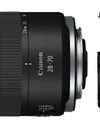
The Canon RF 24-105mm f/4-7.1 IS STM is a smaller, lighter and more affordable alternative to the Canon RF 24-105mm f/4 L IS USM – the ‘kit’ lens that released with the Canon EOS R mirrorless back in 2018.
The L-series version performed better than its kit lens designation might suggest, and it remains a formidable all-purpose optic – so much so that it sits at the top of our best Canon RF lenses guide. But where does the new non-L version come in? And the biggest question – why the move to f/7.1, and what effect does this have on the way the lens functions? Let’s take a look…
Build and handling
The first thing you notice about the new 24-105mm is the form factor. Compared to the f/4L it feels sleek and slender, though no less sturdy. Unsurprisingly, the f/4-7.1 seems to have been designed to pair with the RP in mind – and it has to be said that they make an ideal pairing.
The zoom ring doesn’t have quite the feathery glide as the one on the f/4L, though it achieves just the right balance between tightness and smoothness. It lacks a LOCK button to stop the mechanism telescoping open, but creep isn’t an issue. Where the f/4L featured three rings to accommodate manual focus, zoom and control, the f/4-7.1 only has two. This means the control ring does double duty as a customizable input (aperture, shutter, ISO, white balance or exposure compensation) and manual focus, which is toggled by flicking the FOCUS / CONTROL switch on the side of the lens.
هذه القصة مأخوذة من طبعة July 2020 من PhotoPlus : The Canon Magazine.
ابدأ النسخة التجريبية المجانية من Magzter GOLD لمدة 7 أيام للوصول إلى آلاف القصص المتميزة المنسقة وأكثر من 9,000 مجلة وصحيفة.
بالفعل مشترك ? تسجيل الدخول
هذه القصة مأخوذة من طبعة July 2020 من PhotoPlus : The Canon Magazine.
ابدأ النسخة التجريبية المجانية من Magzter GOLD لمدة 7 أيام للوصول إلى آلاف القصص المتميزة المنسقة وأكثر من 9,000 مجلة وصحيفة.
بالفعل مشترك? تسجيل الدخول

The Art of Copying Art - James Paterson shows you how to use your Canon gear to capture artwork and paintings the right way with simple camera and lighting skills
Whether you want to capture a painting like the above, digitise old prints or reproduce any kind of canvas, there's real skill in capturing artwork with your camera. Not only do you need the colours to be accurate, you also need to master the spread, angle and quality of the light to minimise glare and show the work at its best.This painting by the artist Bryan Hanlon has a wonderfully subtle colour palette. To reproduce the painting in print and digital form, it needs to be captured in the right way.

Fright night
Canon photographer and digital artist Alexander loves to craft incredible fantasy scenes with a spooky horror twist

Sharpen your shots with DPP
Sharpening a digital image also increases contrast at the edge of details

CANON ImagePrograf PRO-1100
Deeper blacks, better bronzing, greater lifespan and 5G Wi-Fi -Canon's new printer is full of new tech, says

Canon's new 'kit lens' is actually a half-price f/2.8 trinity lens!
The Canon RF 28-70mm F2.8 IS STM lacks a red ring, but borrows premium features from its L-series siblings

DREW GIBSON
Pro motorsports photographer Drew on why he hasn't (yet) switched to Canon's mirrorless system, why old-school techniques can be the most reliable, and the lessons learned from more than a decade shooting the world's biggest car brands

Up in smoke
Make a smoky shape in Affinity Photo and get to grips with the amazing Liquify Persona under the guidance of James Paterson

Expand your creativity with Generative Fill
Photoshop's Al-powered feature brings revolutionary new tools to image editing. James Paterson reveals all...

Turn your images into vintage postcards
Wish you were here? Sean McCormack explains how you can give your summer photographs a vintage postcard look

The Angel Malibu
Light painting an American movie producer in the Wadi Rum Desert in Jordan was a highly unlikely evening out for David!